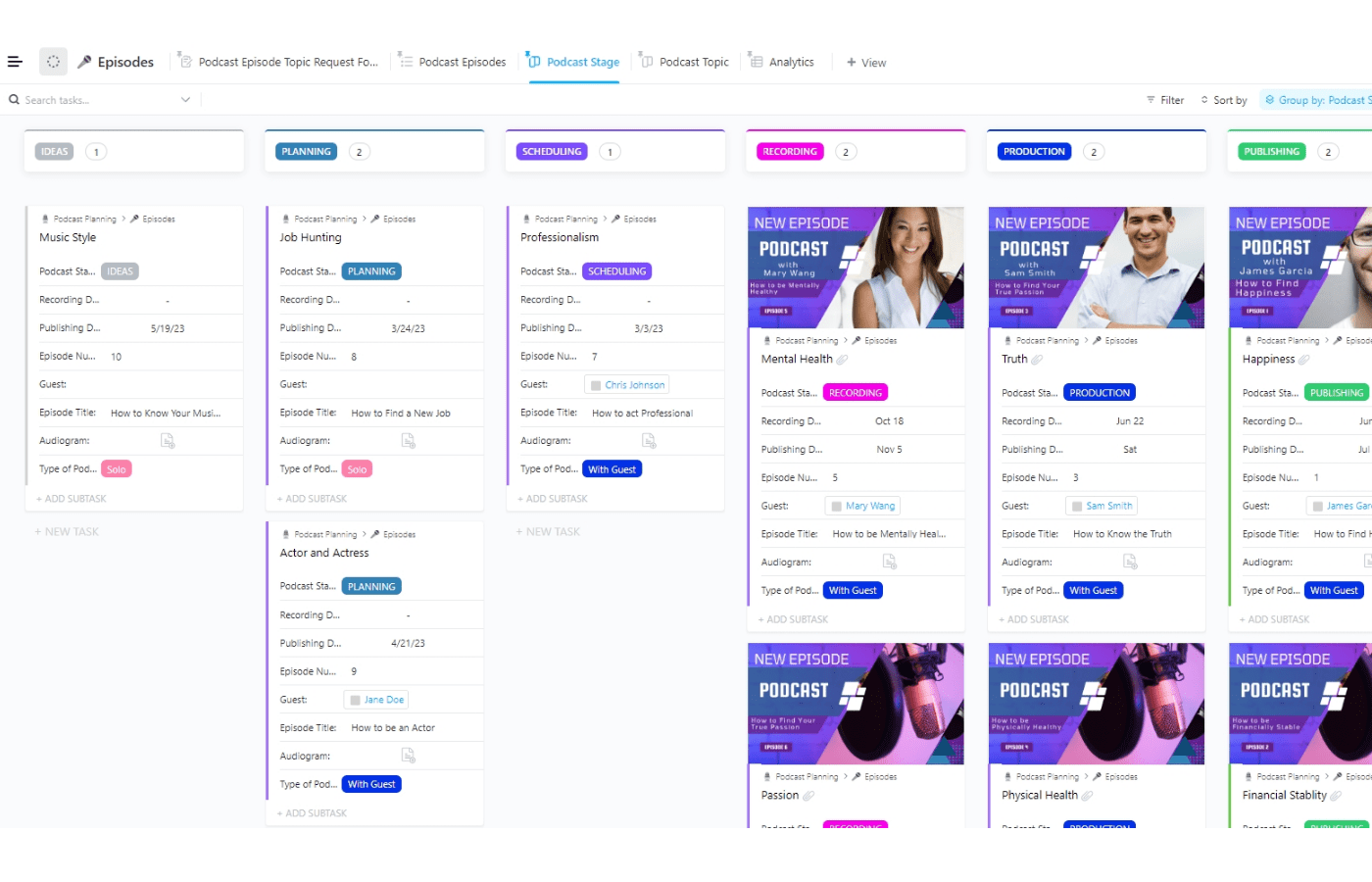The continuing expansion of the internet creates the innovating force that drives web development technologies. Simple websites and static pages are now rare to see as individuals and organizations make the most of a platform with billions of devices connected to it. Scripting languages and modern frameworks resulted in dynamic websites, web database applications, AI-powered bots, progressive web apps, and cloud services.
Web technology today provides more flexible options for businesses. For instance, companies can build their own custom project management system from scratch using an online database builder. This is possible with corresponding financial, time, and manpower investments. Or they can take cloud-based turnkey solutions offered by SaaS providers like monday.com, Asana, or Smartsheet and implement a customizable PM system as quickly as possible.
The key features you want to see in an online database tool are drag-and-drop capability and low-code options. However, each vendor may name these features differently. In addition, some database application builders may fall under more than one software category, like contract management or project management. With so many variations, finding the right online database application tool for your business can be challenging. Here are some of the top tools in the market to help you get started with your search.
Table of Contents
- The top online database app builders
- Why build an online database application for project management?
- What you need to know to build your project management tool
- How should your PM database look?
- Building your online database application
- Ready to use an online database app builder?
The top online database app builders
Users and organizations can choose from ready-to-use cloud-based software to support their business. However, companies with unique requirements prefer to use database builders that give them greater flexibility and control. Below are our favorite online database app builders that provide dependable core functions as well as flexible technical platforms for the best combination possible.
Zoho Creator

Part of Zoho CRM, Zoho Creator is among the online application solutions offered by Zoho Corporation. It is a low-code platform that allows users to easily build custom applications without the need for a developer or extensive programming knowledge. The online database builder uses drag-and-drop action and rules-based logic. It gets data from different sources and keeps users’ data in one central place. Zoho allows you to build a variety of apps including project monitoring, project plans, and tasks. The software is compatible with iOS and Android devices.
Node14
 Aside from the many DIY-focused database builders, many people find it most efficient to partner with a company that can consult with them to build the software best suited for their needs. Node14 specializes in custom solutions, and its team of experts is well versed in building bespoke databases without the slow speeds and high cost of other options. Move away from disorganized and under-featured spreadsheets, and streamline your operations by partnering with Node14. They offer free consultations to discuss if Node14’s software and services will be a good fit for your business.
Aside from the many DIY-focused database builders, many people find it most efficient to partner with a company that can consult with them to build the software best suited for their needs. Node14 specializes in custom solutions, and its team of experts is well versed in building bespoke databases without the slow speeds and high cost of other options. Move away from disorganized and under-featured spreadsheets, and streamline your operations by partnering with Node14. They offer free consultations to discuss if Node14’s software and services will be a good fit for your business.
Knack
 Knack is an easy-to-use database builder that provides users the tools to solve business problems. They can build apps in simple steps that include defining the database, building the interface, and sharing the data. From its experience in helping companies build online databases and web applications, it has recognized similar requirement patterns. So they’ve created the building blocks of the applications for these requirements. Examples of web database applications made with the software are store locators, job portals, and project management apps.
Knack is an easy-to-use database builder that provides users the tools to solve business problems. They can build apps in simple steps that include defining the database, building the interface, and sharing the data. From its experience in helping companies build online databases and web applications, it has recognized similar requirement patterns. So they’ve created the building blocks of the applications for these requirements. Examples of web database applications made with the software are store locators, job portals, and project management apps.
Read more in our Knack review.
Domo
Domo has all the expected simple database application builder tools for non-programmers to create a useful application in a reasonable time. Besides its low-code and prebuilt options, this database tool also offers an application framework to help build customized data applications and a business intelligence (BI) framework that allows users to do self-service analytics.
Domo is praised for its flexibility and user-friendliness. Customers like the macro view of the entire business and the data accessibility visible to every employee. Other positive comments centered around how easy it was to implement the software solution into the organization.
Some noted pain points include the application’s lack of advanced functionality, like properly displaying information from more than one data source and the inability to filter across multiple tables. Another drawback included the inability to build relational models with existing tables. Finally, repeated comments were made that the software solution is expensive.
IntelliJ Idea
IntelliJ Idea is designed for Java and Java Virtual Machine (JVM) developers that use other JVM languages such as Kotlin, Scala, and Groovy. This application database solution has a context-aware IDE editor that multiple applications can use. In addition, IntelliJ Idea boasts of its out-of-the-box features that provide quick access to its integrated tools and customization options. Though this product offers smart coding assistance, a user will need to have a basic understanding of programming concepts.
Customers positively commented on the IDE editor and how well it works with Java, and the free version of the editor is highly functional. Moreover, IntelliJ Idea has an extensive list of useful plugins, and customers repeatedly praised the plugins and navigation shortcuts, which enabled them to edit faster.
On the other hand, some plugins are memory intensive, so users are encouraged to use a high-end computer. A similar concern mentioned is that the heavy demand on computer resources sometimes freezes the IDE editor, and depending on what is loaded on startup, the application is known for being slow to start. The debugging function doesn’t consistently work and must be re-installed before it can work properly. The application’s slowness in starting or executing essential functions like indexing was a constant negative.
Kintone
Kintone advertises a customizable workplace platform that can support industry-specific departments or functions with its centralized database. This simple database application builder allows businesses to track and share tasks using its collaboration functionality. In addition, Kintone has a library of customizable template applications to meet an organization’s business needs.
Kintone does not require programming knowledge and is easy to customize. Another positive comment stated how easy it is to set up process management and assign roles. In addition, Kintone does not need users to be tech-savvy, and the plugin with modular programming adds to its attractiveness for non-programmers wanting to use this product.
However, the mobile version is not as user-friendly as the desktop version, and the search feature is rigid and not as robust as other search options in similar applications. In addition, integration with other programs is not refined, and the ability to reverse a step in the process management system is not available. One negative comment also stated that there is a lack of user documentation.
New Relic One
New Relic One’s CodeStream works in an IDE editor to help users plan and prioritize tasks in the beginning stages of development. The explorer and error tracking features help dynamically track changes as a user steps through code, and the tracker shows all errors in one inbox location. This database application integrates with over 400 applications. In addition, the New Relic One is an observability platform that provides log, metric, and trace information used by DevOps teams to test their system in production.
Several users commented how easy New Relic One is to install and use. The Application Performance Metric (APM) feature helps diagnose slow transactions and trace and track any program anomaly to find root causes. New Relic One also allows users to see errors in real-time, enabling issues to be resolved quickly. The error reporting feature received favorable comments from customers.
On the downside, the mobile application is inconsistent and returns blank screens on occasion. Also, the user interface can sometimes be buggy, and web pages can be unresponsive. More than one customer mentioned how expensive the New Relic One costs. In addition, the metric information is not always correct.
ProntoForm
ProntoForm is considered a no-code platform that specializes in building mobile forms for manufacturing, oil and gas, and utilities and construction companies. The mobile forms are designed for field service personnel such as installers, maintenance technicians, or inspectors.
ProntoForm is easy to use and set up, and the flexibility is constantly mentioned as a positive. A construction company employee commented that ProntoForm’s features make it easy to create customized forms for each project. Form building and deploying on a mobile device are easy to accomplish. In addition, ProntoForm’s development team, technical support staff, and customer support are reviewed as excellent.
Though custom forms are useful, it takes time to create the forms. The settings options are not readily available. Attaching files is limited, and users cannot send videos. Moreover, several customers commented on the extensive learning curve. The forms builder does not allow users to use specialized fonts like bold or underlined.
Why build an online database application for project management?
A good justification for a business to build its own online database application is the potential cost savings. When a company doesn’t purchase commercial-off-the-shelf (COTS) software for every requirement, it saves on initial software costs and licensing fees associated with each user.
Moreover, since an online database application builder is considered a low-code tool, anyone can use it, saving the business a software programmer’s salary that can be used elsewhere in the organization. In addition, an online database application builder has the potential to meet unique business requirements better than a standard COTS solution that may require specialized customization and cost more to implement.
What you need to know to build your project management tool
The types of applications an online database application builder tool can create are unlimited. For example, a business can create a payment form for a sales department, a project management application for operations, or an approval workflow application for administration.
In addition, a business can address a functional issue that requires converting a spreadsheet to a database or a specific industry like manufacturing that needs to track productivity better. The only limitation imposed on an online database application is the user’s limitations.
Teams use project management standards to make sure they cover all their bases, but project complexity can range from simple to extreme. So, a project management tool will include features to cover the stages of project initiation, planning, execution, control and monitoring, and closing, but also will vary depending on factors like team size, the number of tasks, duration, and budget. At the minimum, a web database application for project management will allow team members to view their tasks, update their statuses, and enter time spent. The tool will also allow the project manager to add, view, and edit a list of tasks, milestones, costs, hours, and resources and create reports.
Important project management functions include:
- Project planning and sequencing
- Work break down
- Scheduling
- Task management
- Resource management
- Budgeting and cost tracking
- Time tracking
Some very capable online database applications can provide all the functionality included with project management software. However, the advantage of using an online database application in the business is the customized experience gained by the organization. Project dashboards, reports, and workflow tasks are commonly used applications by multiple departments and employees.
By purchasing an online database application builder that also incorporates project management functions, a project manager can pool internal resources together to create a business-specific project management solution. Online database applications such as Kintone, Airtable, and ActiveCollab are fully capable of meeting a project manager’s needs.
Lastly, even if a database application lacks a specific project management function, it can be added using third-party integration.
Most common uses of an online database application tool
Online database application builders should not be limited to the most common uses, but if you had to select one software tool it can always replace, it would be spreadsheets. Businesses can immediately see a productivity increase when an online database replaces spreadsheets.
Like any business does with wanting to implement any software solution, identify the reason for developing a software solution, then define the scope. For example, is it a department-only issue, a process not meeting expectations, or a common industry concern? The next question is, can it be solved with a computer, and if the answer is yes, most likely, it can be solved with an online database application developed solution.
How should your PM database look
To create your custom project management tool, your online database builder will provide you with the tools and space to create tables that will hold your data. For every project, you need to enter information about your customer or client, their contact details, project details, milestones, tasks, hours spent per task, cost per task, and user details. Since you will be tracking project items, you need to create tables that will describe or hold the different status of a project, a milestone, and a task. Additionally, you need to plan a database schema or how specific records in one table connect to another table to create relationships and proper referencing.
Building your online database application
After completing your database schema, use your online database application builder to create your tables. Depending on the software you choose, you can do this one table at a time. Some will allow you to import your tables and data on a spreadsheet or migrate them from a desktop database program. You can also check if the database builder has prebuilt PM database templates that you can customize. After creating your tables, build the web pages that will allow you to enter data (forms) or display them (dashboards, calendars, or reports).
Ready to use an online database app builder?
Online database app builders help teams and companies build their own custom web database applications, such as a project management tool. Each solution with its set of features can provide benefits depending on user requirements. Our featured database builders have features and tools that make them the ideal solution depending on a user or its requirements.
However, all of them require a series of manual processes where you invest a significant amount of time, cost, and effort to get exactly what you want. On the other hand, cloud-based project management solutions such as Smartsheet, Asana, or monday.com have all the database tables you will need with regular updates of features. They also come with customizable dashboards, statuses, fields, and reports that give you flexibility and availability as you need them.





